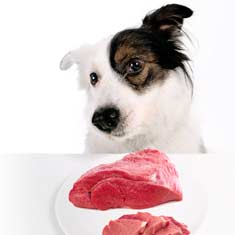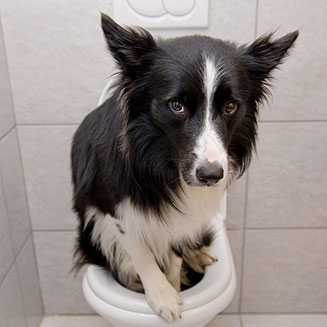Herbal Remedies for Dogs
Eastern medicine has used herbal remedies for thousands of years for both their curative and preventive properties. In fact, many common prescription medications today were derived from plants and their by-products. Plants produce certain compounds which they use to protect themselves from hazards, and many of these compounds are protective for animals as well.
Why doesn't my vet prescribe herbals?
Many vets don't recommend herbal products for the simple reason that they don't understand them. Most vets are trained to use the latest and greatest technology to cure existing conditions. Veterinary schools aren't known for teaching prevention, nor do they rely on "technology" that is thousands of years old.
Another reason many veterinarians don't deal with herbs is that there is no quality control system in place to assure that the herb you have purchased is the one you really want. Pesticides, fungicides, and fertilizers can contaminate the herbs, and they may even render its active ingredients useless. Improperly prepared compost can introduce bacteria into the herbs.
The strength of the active ingredients can be altered by the horticultural practices of the grower. This is especially troubling, as some herbs are actually toxic if given in higher dosages than recommended. For example, garlic contains thiosulphate, which can be harmful to dogs in large amounts, but small amounts of the herb can lower blood pressure, clear waste from cells, and repel fleas.
Finally, for many herbs, further study is needed to see how the herbs interact with any conventional medications your dog may be taking. Research studies generally focus on either herbs or modern medications, not both. Very little is known about how they affect each other. It is vital that you tell your vet if you use herbals so he can advise you if you need to stop the herbs while your dog is on another medication such as antibiotics.

How do I prepare herbals to give to my dog?
For some herbs, the entire plant is used, while other remedies include only the flowers, only the leaves, or only the roots of a particular herb. It is vital that you know how to properly prepare herbal remedies, as some portions of certain plants are poisonous. It is in your dog's best interest that you consult a competent herbalist before giving him any herbal products.
Oral products are taken as infusions, tinctures, decoctions, teas, and tablets. Products for external use include ointments, lotions, creams, poultices, compresses, and infused oils.
Infusions are prepared by boiling the leaves and flowers of an herb in water. The liquid is strained to remove the remaining solids and drunk like tea.
Tinctures are herbs that have been soaked in water or alcohol for weeks, then rinsed and stored in dark bottles in cool, dry places for up to two years. Dogs really shouldn't have alcohol, so vegetable glycerin may be used as a base in place of the alcohol. Vegetable glycerin will give the tincture a flavor similar to corn syrup, which your dog will be more willing to drink.
Decoctions are prepared by boiling the bark, root, and berries in water. The liquid is then drunk either hot or cold.
Which herbs are useful in dogs?
Aloe vera can be used to reduce itching due to insect bites or hot spots. In addition, it can treat minor burns. Aloe vera has anti-bacterial properties so it may be used on scars following surgery. Its bitter taste will discourage your dog from licking the area where it is applied. Taken internally, aloe acts as a laxative.
Burdock is used to clear toxins from the body, as well as to soothe arthritis pain and heal eczema. It is also helpful for animals with liver or kidney problems. Fresh burdock roots can be found at your local health food store. They have a nice flavor, so you can just cut them up and add them to your dog's food.
Calendula is used to treat skin irritation such as poison ivy, insect bites, and minor burns.
Cat's claw contains alkaloids, phytochemicals, and tannins. They can reduce inflammation and remove free radicals.
Coltsfoot can be used to relieve coughs.
Echinacea purpurea strengthens the lymphatic system, boosting the dog's immune system
Ephedra can be used for asthma or other respiratory problems. However, too much ephedra can cause heart arrhythmias and high blood pressure, as well as anxiety.
German chamomile is a sedative, used to calm anxious dogs. However, it can cause a pregnant dog to lose her puppies, and should never be used if you suspect your dog is pregnant.
Ginger relieves nausea, and is especially useful if given to your dog before long car trips.
Ginkgo biloba is made from the leaves of the ginkgo tree and has been shown to improve blood flow to the brain. It should not be used in pregnant animals.
Hawthorn is used to combat heart arrhythmias and to control blood pressure.
Huang Qi can improve the immune system and can reduce both blood sugar and blood pressure. You may see an improvement in your dog's energy level when he takes huang qi.
Indian ginseng promotes health, vigor, and vitality. Siberian ginseng can reduce stress and improve immune functioning. American ginseng increases resistance to stress and can improve skin and muscle tone. Ginseng is often recommended only for male dogs. For females, dong quai is used to improve energy levels.
Kava Kava can be used as a sedative to calm anxiety, but it is known to cause liver problems. Your vet should monitor your dog's liver function with frequent blood tests.
Licorice can reduce inflammation, soothe arthritis pain, and kill viruses. Many herbal vets use licorice to treat colon inflammation. Licorice is dangerous, however, to dogs with heart disorders.
Mistletoe can help the immune system and reduce blood pressure.
Milk thistle contains flavonoids, a known antioxidant which remove free radicals, one of the key body chemicals associated with aging.
Raspberry is used in pregnant dogs to maintain the health of the uterus and to stimulate quick milk production after the litter is whelped.
Red clover has been used against cancer. It also contains coumadin, so the animal must be monitored for bleeding while on red clover. Other ingredients include salicylic acid (aspirin) and estrogen.
Slippery elm bark can be used to calm down the lining of the colon, reducing inflammation and reducing diarrhea.
Tea Tree oil is often spread on a dog's skin to help control itching.
Valerian is an effective tranquilizer which can be used to calm a nervous dog.
Yarrow increases urine output and can be used to help flush your dog's body of toxins. It can also bring down a fever and reduce swelling.
What else do I need to know about herbs for my dog?
Herbal medicine is a huge field, including not just the herbs themselves but also the philosophies embraced by Eastern cultures. Things like yin and yang, energy balancing, and other ancient beliefs are important. Although (obviously) your dog cannot study the great philosophers, it is worth doing further research into the concepts which support the use of herbal remedies. Your dog may benefit from the herbs in isolation, but the greatest advantage comes from total immersion in the herbal lifestyle.
Doggies Den: Latest Articles
 Homemade Thanksgiving Treats for Your Dog
Homemade Thanksgiving Treats for Your Dog
NUTRITION We all want to include our dogs in our holiday celebrations, but hopefully, you're aware that sharing table scraps with your dog isn't always the best idea.
 Keeping Your Dog Safe during the Summer Months
Keeping Your Dog Safe during the Summer Months
HEALTH Summer is coming on fast, so it’s time to plan how you will keep your dog safe and healthy through the lazy, carefree, warm days.
 Vaccination Time Again-Keeping Your Puppy Healthy
Vaccination Time Again-Keeping Your Puppy Healthy
DOG HEALTH So you have your new puppy picked out. There are quite a few shots, treatments and examinations that will keep the newest member of your family healthy.
 Canine Thanksgiving Feast
Canine Thanksgiving Feast
NUTRITION With the wide variety of food at Thanksgiving dinner, chances are you'll want to give your dog something special, too. If you're contemplating what to feed your dog for the holiday, here is a guide to a great Canine Thanksgiving Feast.
 Dog Walking Tips Every Owner Should Know
Dog Walking Tips Every Owner Should Know
DOG FUN Walking your dog is not only crucial to keeping him healthy and happy, it strengthens the bond between your canine friend and his caregiver. There are a lot of obstacles out there. Don’t forget these simple tips to keep your walk fun and safe in the outside world.
 The Benefits of Physiotherapy for your Dog
The Benefits of Physiotherapy for your Dog
HEALTH The same techniques that physiotherapists use to treat a variety of injuries and conditions in humans have been adapted to suit animals with great success. Family pets, show dogs, and working dogs can all benefit greatly from physiotherapy. Dogs whose activities involve a lot of agility are especially susceptible to the types of problems that physiotherapy can address.
 The Decision- Adding a Dog to Your Family
The Decision- Adding a Dog to Your Family
FIRST TIME OWNERSBringing a dog into your family is a decision where many people don’t realize it’s magnitude until after they have the dog. There are a number of things that you need to research before you decide to purchase a dog, and it starts right in your own home.
 Bringing Your Dog Into Your New Baby's Life
Bringing Your Dog Into Your New Baby's Life
HEALTH Many believe that a dog and a new baby cannot happily coexist, so therefore the dog has to go. This is not necessarily the case.  A new baby does not mean you have to abandon your dog.

Doggies Den:
Most Popular Articles

Dog Pregnancy Symptoms
HEALTHIf you suspect your dog might be pregnant, check out part one in this series on pregnant dogs, where we cover pregnant dog symptoms.

Dog Birth
HEALTHIn the third article of our dog pregnancy series, we look at the wonderful, but messy, process of bringing newborn puppies into the world.

Indoor Dog Potties
DOG PRODUCTSIt's been a long day at work. You were so busy, you didn't even take time to eat a sandwich, let alone run home to let your dog out. You're on your way home, knowing the poor dog is crossing his or her legs by now, when your car breaks down, delaying you even further. Can't somebody make this easier?

Your Dog’s Digestive System
PHYSIOLOGYEver wonder why your dog eats so fast? Or why he eats gross things? Or why he gets sick to his stomach? Or why his waste stinks so bad? Some of these things are normal, some are not.

Canine Respiratory System
BREATHINGThe basic function of your dog's respiratory system is to bring oxygen in to and remove carbon dioxide from the body. Knowing the symptoms of respiratory diseases can help you help your stay healthy.

Shelter Dog Adoption Tips for Success
ADOPTION Are you intimidated by the prospect of "rescuing" a dog from a shelter? One reason that you may be wary of adopting a dog from a shelter is not knowing how to choose. Adopting a dog from a shelter can be a rewarding process, if you're prepared to do a reasonable amount of research.

Canine Urinary Tract Infections
SYMPTOMS AND TREATMENTDoes your dog seem to be having trouble relieving his or her bladder? Learn how to recognize the signs of urinary tract infections and how to treat them before they spread.

What to do for Dog Diarrhea
SYMPTOMS AND REMEDIESIf you have dogs in your house for any length of time, you have likely experienced at least one bout of dog diarrhea. Beyond the pain in the tuckus involved in cleaning up the mess, you should know what causes diarrhea, and when it's important to see the vet.

What to do for a Dog Bite
DOG BEHAVIOR Getting bitten by a dog can be scary, and you may be tempted to run around in circles for a while, trying to figure out what to do. Here's our guide to help you manage the situation.

Top Ten Tips for Living with a Senior Dog
DOG HEALTH Bringing home a new puppy is so exciting, but it doesn’t take all that long for your exuberant puppy to grow into a senior dog who may have special needs. Here are the doggies.com top ten tips for taking care of your companion who has been with you through so much.
